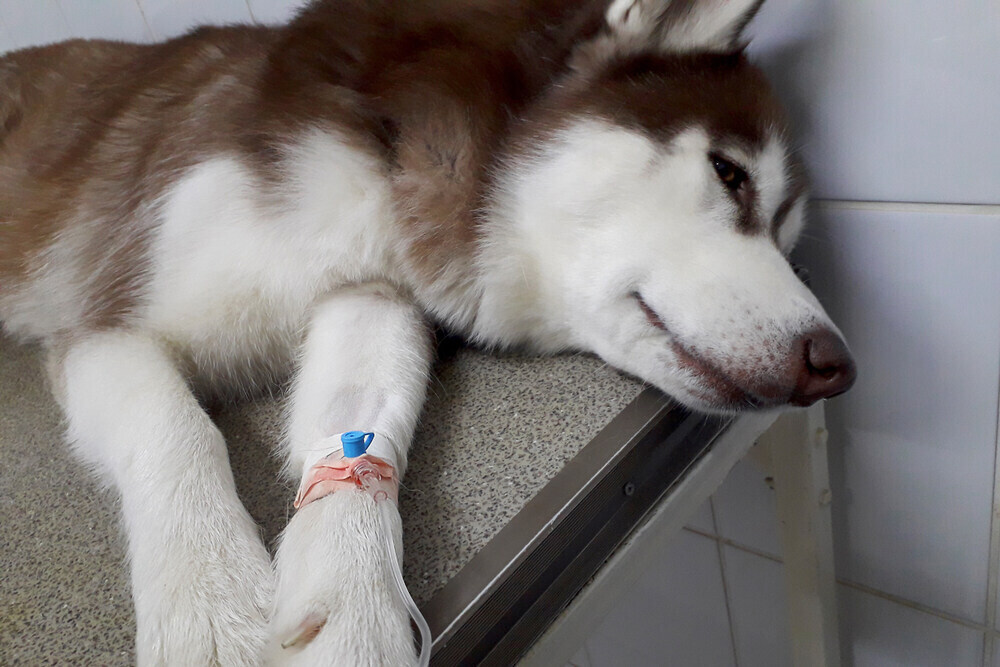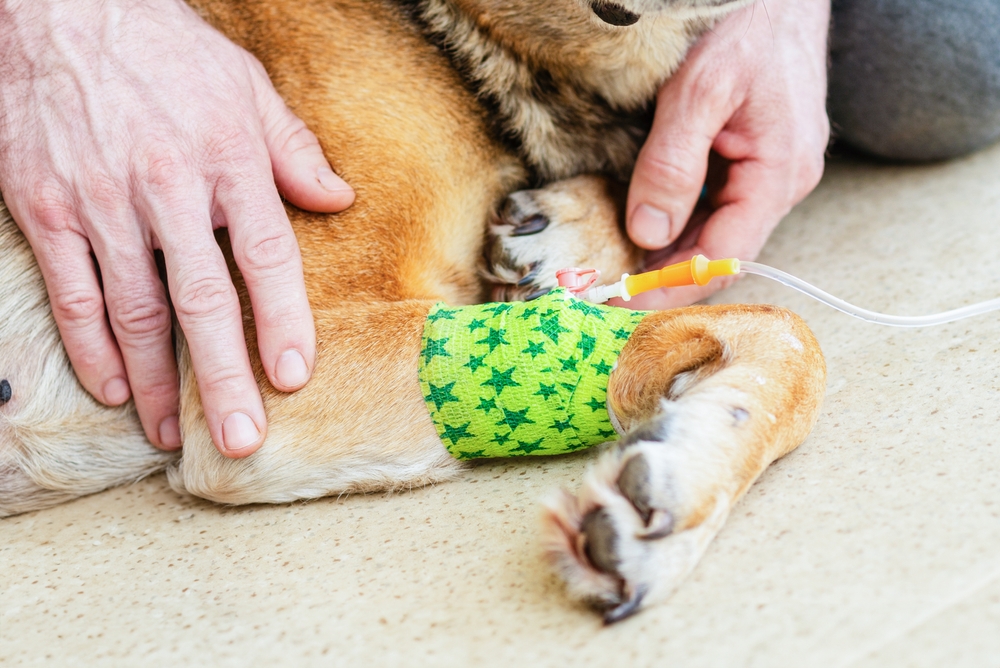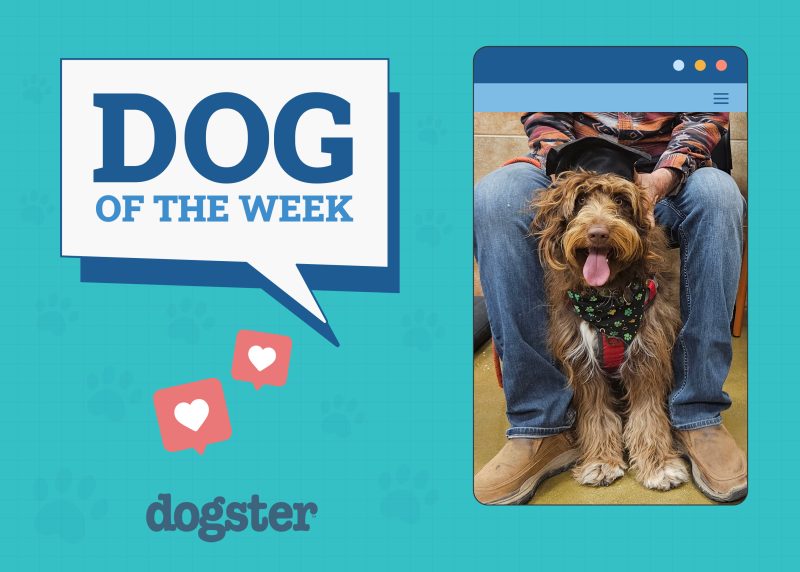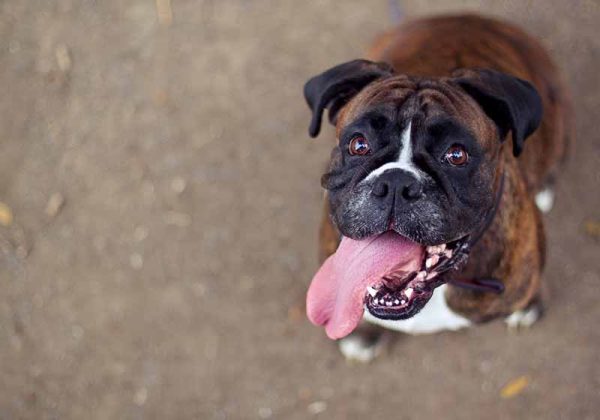In this article
View 4 More +Finding out that your dog has cancer is a heart-dropping moment. Although it can be a heavy diagnosis, it’s important to know what your options are so that you can provide the best care for your dog. Chemotherapy is one treatment option that can be used for certain types and stages of cancer. As you research different treatment options, make sure to have a conversation with a veterinarian to determine if chemotherapy is a good course of action for your dog.

What Is Chemotherapy?
Chemotherapy is a treatment used for cancer in dogs. It involves using chemical agents to target and attack cancer cells with the goal of either inhibiting their growth or destroying them.
In most cases, chemotherapy is the suggested form of treatment when there are widespread tumors in the body or if there’s a risk of cancerous cells spreading from a specific tumor location. It’s usually used alongside surgical removals of tumors. Sometimes, dogs will undergo a round of chemotherapy before getting surgery to remove a tumor, in the hopes of shrinking the tumor. Dogs can also have a tumor surgically removed and then receive a follow-up treatment of chemotherapy to control the spread of cancerous cells.

How Is Chemotherapy Given?
A dog must first be seen by a veterinarian and diagnosed with a particular type of cancer before they can start chemotherapy. Depending on the type of cancer and your dog’s situation, there may be one or more chemotherapy drugs that could be used. Depending on the drug, chemotherapy can be administered either orally or by injection into the tumor, into the vein, muscle, or under the skin.
As chemotherapy requires specialized knowledge and equipment, it is most commonly prescribed by veterinary oncologists who specialize in the treatment of cancer. However, some general practitioners may have the ability to initiate chemotherapy, or at least administer it under the direction of an oncologist.
Chemotherapy treatments usually start with giving a dog the highest tolerated dose based on their size. Sometimes one drug is used, other times multiple drugs are selected. The dosage amount and the chemotherapy schedule will depend on various factors, such as the drug(s) used, your dog’s size, age, other health problems, response to previous chemotherapy, the type of cancer, and the stage of cancer. Therefore, it’s difficult to say how long chemotherapy will last because it’s different for each dog.
It’s also important to note that chemotherapy is just one part of your dog’s overall cancer treatment. You may also have to schedule surgeries, radiation, follow up tests, and other treatments recommended by a veterinarian.
What Happens if You Miss a Dose?
It is very important that you adhere to the chemotherapy schedule made by a veterinarian or oncologist. Since the investment in cancer treatment and chemotherapy is so high, and the timing of doses is so important, you should never put yourself in a situation where you miss the dose.
Timing is imperative to maximize killing of cancer cells, but also to allow healthy cells to recover. Treatment will be less effective if you miss doses because long gaps between doses can give cancer cells time to multiply. Therefore, it’s important to be on top of your dog’s chemotherapy schedule and not miss a dosage.

Potential Side Effects of Chemotherapy
Chemotherapy does have several potential side effects, as the treatment can kill rapidly dividing non-cancerous cells, like those lining the gastrointestinal tract and within hair follicles.
Chemotherapy may also affect the bone marrow and interfere with blood cell production. Therefore, dogs may have weaker immune systems and be prone to infections during chemotherapy treatment. It’s common for blood tests to be administered routinely with chemotherapy to monitor a dog’s blood cell count. Though it’s uncommon, dogs can experience allergic reactions to chemotherapy. Chemotherapy may also cause cardiac problems.
Since there are different side effects that range from minor to severe, it’s important to monitor your dog’s condition closely throughout the entire treatment schedule and notify a veterinarian of any side effects and changes in behavior you see from your dog.
- Vomiting
- Diarrhea
- Hair loss/ slow hair regrowth
- Reduced appetite
- Lethargy
- Fever
- Irritation at the IV injection site
- Cellulitis and necrosis
- Cystitis

Frequently Asked Questions (FAQ)
Is it worth putting my dog through chemotherapy?
Chemotherapy should only be given to dogs that are likely to experience an improvement in quality of life from treatment. Because quality of life is prioritized, chemotherapy treatment for dogs has less side effects than treatment for humans. Fewer than 10% of pets need hospitalization to manage the side effects of their chemotherapy.
Therefore, chemotherapy can be worth it for some dogs if it benefits their overall quality of life. It may also not be a recommended course of treatment if it brings more pain than healing for dogs. It’s important to communicate with a veterinarian regularly to determine the best course of action for keeping your dog as comfortable and as happy as possible.
What is the average cost of chemotherapy for dogs?
The cost of chemotherapy will depend on a number of factors, including the type of cancer, the type of drug, and the duration of the treatment. You could be offered a few different options, with differing costs and efficacies. The total cost of an entire chemotherapy treatment can range from $3,500 to over $10,000. The price of single doses of chemotherapy drugs has a wide range from $150 to $600.

Does pet insurance cover chemotherapy?
Comprehensive pet insurance plans usually include cancer treatment, but you will need to check your policy to be sure. However, it’s only covered for dogs that haven’t been diagnosed with cancer before purchasing an insurance policy because pet insurance plans won’t help pay for pre-existing conditions. You won’t be reimbursed for any cancer-related veterinary bills if you enroll your dog in a pet insurance plan after they receive a cancer diagnosis.
What are alternative treatments for cancer in dogs?
Conventional cancer treatment for dogs includes chemotherapy, radiation, immunotherapy, and surgery. However, it can be appropriate to integrate holistic therapies into a dog’s overall cancer treatment. It just depends on the dog’s individual condition.
While holistic treatments can’t cure cancer on their own, they can help with managing certain side effects and symptoms. Common holistic therapy methods used for cancer include acupuncture, supplements, CBD and hemp-based products, and medicinal mushrooms. Making changes to diet and nutrition may also help complement conventional cancer treatments.
Beware of anyone trying to sell you “natural” products with claims that they can cure cancer. The best-case scenario for these scams is that they don’t have any effect on your dog. However, some can be dangerous or interfere with cancer treatment and worsen your dog’s condition. Always consult a veterinarian before adding any type of holistic treatment to your dog’s cancer treatment plan.
If you need to speak with a vet but can't get to one, head over to PangoVet. It's our online service where you can talk to a vet online and get the personalized advice you need for your pet — all at an affordable price!

Conclusion
Chemotherapy for dogs differs from chemotherapy for humans, as it’s more focused on your dog’s quality of life, comfort, and happiness. It can be used to treat certain types of cancers, but it’s not the only form of treatment. Cancer treatment for dogs can include chemotherapy along with other types of therapy, such as radiotherapy and surgically removing tumors. Holistic therapies are also available and can create positive lifestyle changes for your dog and help them feel more comfortable.
Since there are different treatment options for cancer, make sure to maintain clear communication with your veterinarian. Communicating with your veterinarian will ultimately help you track your dog’s health and ensure they’re on the best possible treatment plan.
See Also:
Featured Image Credit: ARVD73, Shutterstock





















